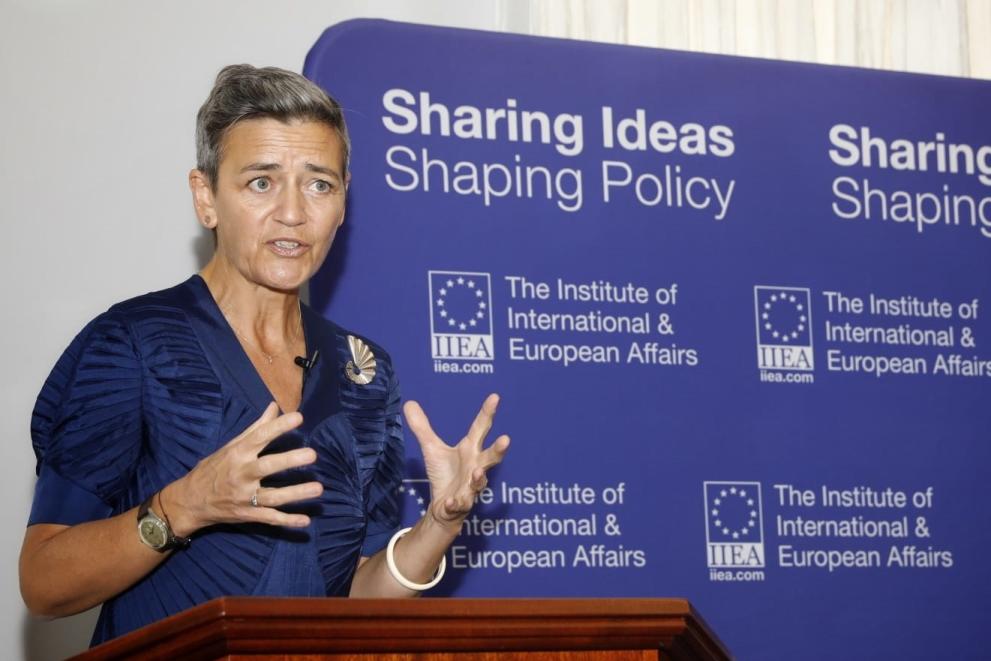
"Check against delivery"
Europe in changing times
Good afternoon,
And thank you for this invitation. With so much happening in the EU and globally, the chance to come together like this is precious. It allows us to step back and reflect on the ‘big picture'.
Because we are experiencing more than just a period of ‘change'. This is an inflection point in our history. We are dealing with several crises, and it is sometimes difficult to keep the positive spirit.
Russia's unjustifiable war of aggression against Ukraine is an attack on our common principles and shared values. Freedom, democracy, and the right for every state to decide for itself. The attack seriously violates what we believe in, and it undermines the international rules-based order.
We are all affected by this war. Some more, some less, but rising prices - for energy and for other things too - always hit the most vulnerable hardest.
This crisis comes after the Covid pandemic – which was, and still is, a stress test for us all. All this comes on top of the climate crisis. We saw this summer in Europe what it means to be exposed to the effects of global warming.
We also see an erosion of confidence in governments and democracies. Yet against this dire background, it is striking how well our common institutions continue to function.
We acted swiftly and decisively during the Covid crisis and our reactions to the Russian aggression in Ukraine has been forceful.
To give just one example: Consider the EU Recovery Plan, which for the first time has allowed the EU to tap the market using common financial instruments, in order to finance our recovery. If we had stood together in this room five years ago and predicted that development, it would have sounded rather far-fetched. Yet we are doing it.
Another example is the strength of the EU's sanctions against Russia. Our actions were both swift and united. The sanctions are taking their toll. Without technology transfers from the West, Russian firms' capacity to innovate will be significantly undermined. Nearly 1,000 international companies have left Russia already. Russia is also experiencing a significant “brain drain”, as the well-education leave. The Central Bank of Russia said recently that the banking sector has lost 1.5 trillion rubles in the first half of 2022 alone.
With this same resolve, we will also be able to handle the pressing challenges of energy shortage and economic pressure this brings about.
What is important is that we resist the temptation to see ourselves as ‘bystanders': Change is not ‘happening to Europe'. We have real choices to make.
Of course, in such an unstable world, we need partners. The EU cannot succeed alone. This is the time to invest in the power of democracies, starting with a core group of our like-minded partners.
Similar to the priority that Ireland attaches to its relationship with the US, the transatlantic partnership remains the most important strategic relationship for the EU and its Member States. The transatlantic relationship is based on a shared history, shared values and shared interests. Ireland, with its deep historical connections and people to people links to the US, is a perfect illustration of this bond.
The EU and the US are more united than ever, with an unprecedented level of cooperation and coordination. One concrete example of strengthened cooperation is the Trade and Technology Council, where we are working together to set the rules of the road for the 21st century economy and ensure democracies lead the technological race.
In addition, just this May, we launched a digital partnership with Japan, another important global partner that shares our core values. And more are in the works - with Singapore and South Korea.
A central priority for us and our partners is, of course upholding the global rules-based order, with the United Nations at its core. The ground-breaking UN-EU Retreat held just outside New York in July was an example, on top of our day-to-day work in support of these institutions.
This is needed now, more than ever. Geopolitical rivalries are harming efforts to promote peace and prosperity, hampering humanitarian responses and undermining trust. The fallout is there for all to see, in higher prices and scarcity of food, energy and finance.
We are not willing to accept this. The EU will work actively and tirelessly to ensure that people and nations have a choice, that they have equal rights and that we create markets where economies can thrive.
In this spirit, the EU announced in February the Global Gateway Africa-Europe Investment Package, worth EUR 150 billion. The gateway is a promise to invest in connectivity, in transport, energy, digital and African health sovereignty. It stands for a renewed and enhanced cooperation for peace and security and on migration and mobility, and a commitment to multilateralism.
Looking at the world, at the war in Ukraine, at the protests in Iran, at the drought in Africa, the answer for us as Europeans is to double down on the things that make us strong. We have come this far because we believe in democracy, in liberty, in fair, open markets and in the Rule of Law. And most of all, we believe in peace. These are values worth defending; worth fighting for.
Our European Union was born on the ashes of a horrible war. It was created as a vision on how to build strength from diversity. By doing so, we escaped from the spectre of protectionism, militarism, and the iron fist of dictatorship.
Let's use this time of change to continue on an even better path. For Europe, and for the world.
Thank you.
Details
- Publication date
- 30 September 2022
- Author
- Representation in Ireland
